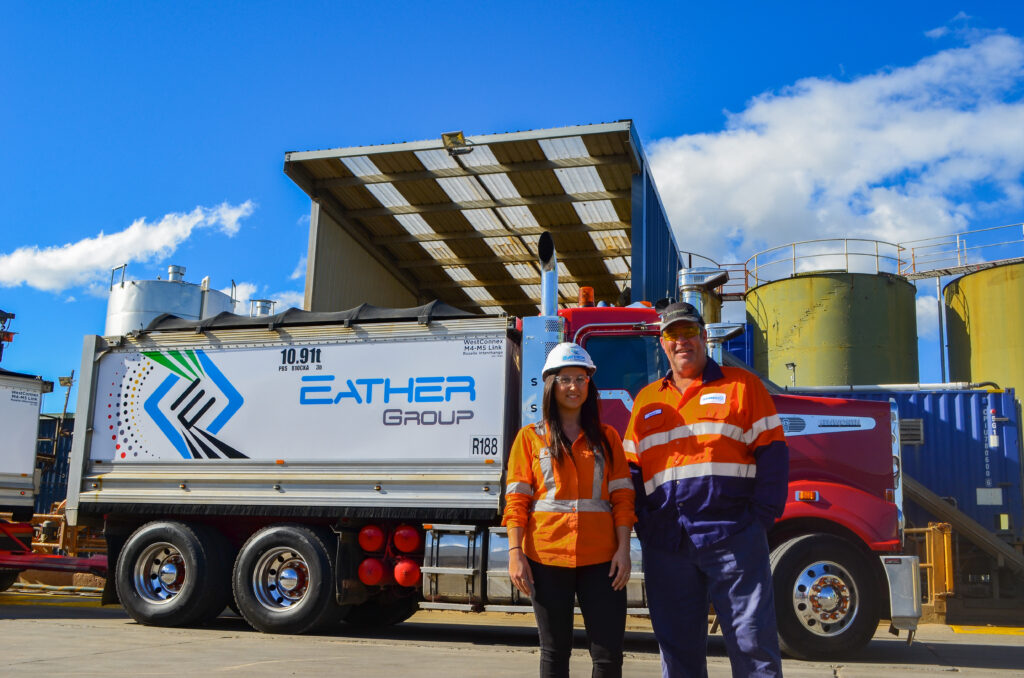They don’t let us down. If they say they will get a truck here, they will get a truck here rain, hail or shine.
They don’t let us down. If they say they will get a truck here, they will get a truck here rain, hail or shine.
You may have heard about the circular economy, but what about the indigenous circular economy?
For seven years, Cleanaway has been using the services of Indigenous waste-to-resource business Eather Group, which provides environmentally, socially, and economically sustainable solutions within the transport, waste and bulk materials industries and is a leader in the development of a ‘circular economy’ within NSW large construction projects.
In accordance with NSW Environment Protection Authority guidelines, Eather Group transports treated drilling mud for Cleanaway, one of its five largest customers, and finds uses for it in road and land projects. It also sources recycled soil to be used in various processes at Cleanaway facilities.

Pictured: Eather Group Driver Bianca Clark and Cleanaway Windsor treatment plant Operator Jason Dowse
Eather Group’s passion is supporting the local community, and the income it receives from clients like Cleanaway is funneled into providing local jobs for local people, sponsoring local events and clubs, providing free disaster relief such as during the recent Hawkesbury River floods, and engaging with other Indigenous businesses, according to Marketing Manager, Divinia Eather.
“We have always valued our relationship with Cleanaway, as it fits with our purpose of achieving a circular economy,” she says.
The company, started by husband and wife duo Peter and Sally-ann Eather 11 years ago, has developed what they describe as an ‘incubation system’ with up to 12 other NSW-based Indigenous businesses and social enterprises included in their supply chain.
These businesses work on any given project, supplying anything from soil testing, transport, and labour hire, to plants, office furniture and uniforms.
Eather Group becomes involved with projects in the early stages, using decades of experience in selective mining to excavate, manage, and transport materials without contamination to be rehomed and reused within the industry.
For instance, Eather Group salvaged 200,000 tonnes of premium shale from a North Sydney project, redirecting it from landfill to a brickmaking facility within their network. The engineers and architects managing the rebuild have agreed to buy back the bricks to use in the project.
“With the support of Cleanaway as one of our key waste partners, we have worked together to treat and repurpose materials on private and government projects,” Divinia says.
Eather Group works with Cleanaway’s Windsor branch, which is part of the Bulk Liquids Waste business unit and provides a range of services such as collection and treatment of industrial wash water, oily water, drilling muds and oil and bunker waste.
Windsor Branch Manager Ravi Maharaj says Cleanaway values Eather Group for its reliability.
“They don’t let us down. If they say they will get a truck here, they will get a truck here rain, hail or shine. I have been dealing with them for the last five or six years and their service doesn’t fail,” he says.
Eather Group goes beyond business with Cleanaway represented at the NAIDOC ball run by Merana Aboriginal community association sponsored by Eather Group.
Ravi says Cleanaway is proud to play its role in supporting indigenous businesses, which in turn helps to achieve our vision of full inclusion and participation of Aboriginal and Torres Strait Islander peoples in our current and future operations and partnerships.
Procurement is one of a number of ways we work to achieve our vision, which is outlined in our ‘Innovate’ Reconciliation Action Plan (RAP) 2018–2020, along with education, employment and providing a culturally safe workplace.
Contact us to learn more about how we’re making a sustainable future possible for communities and businesses across Australia.